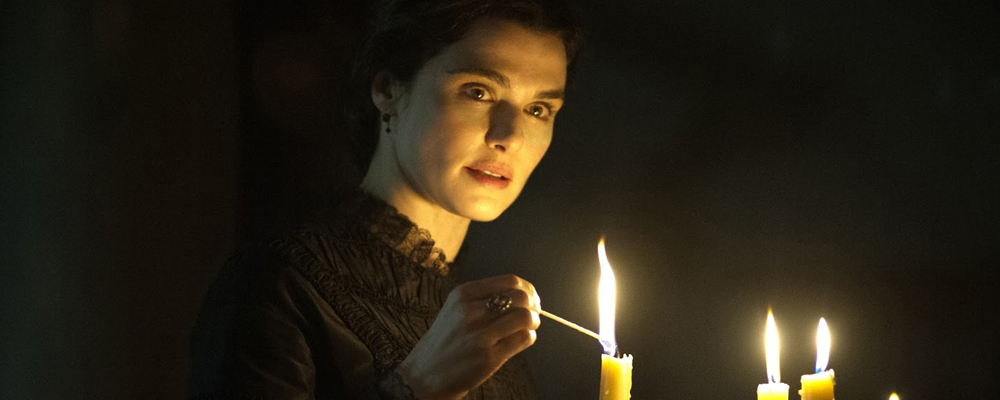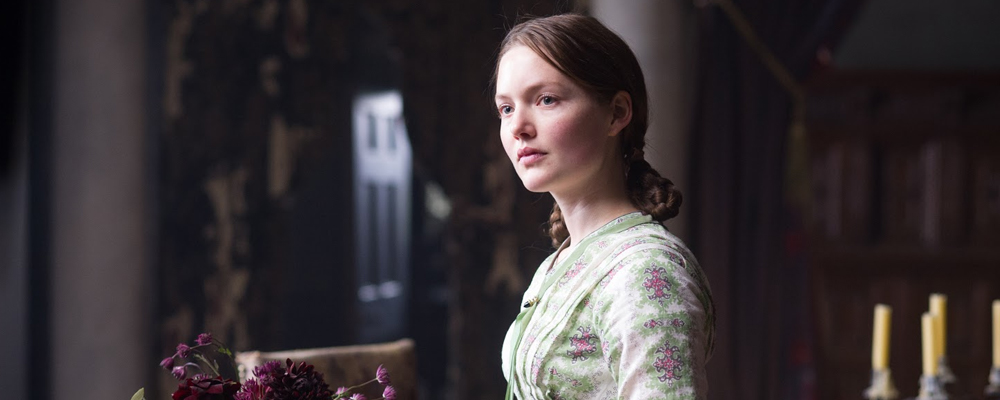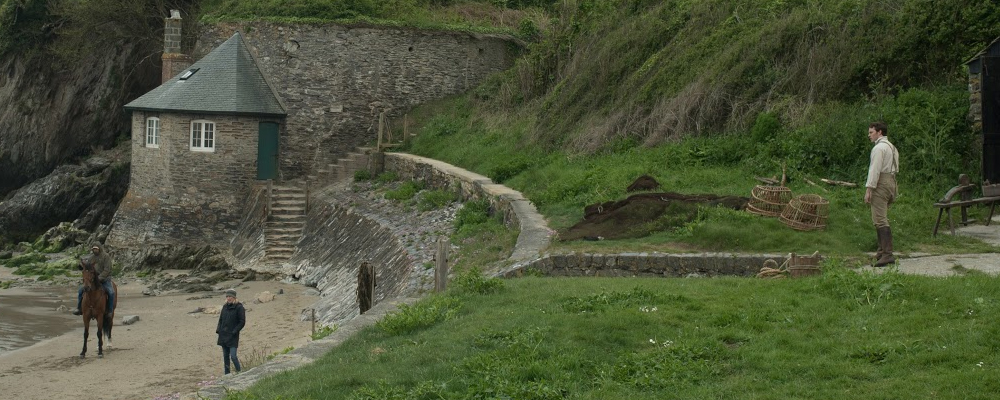‘My Cousin Rachel’ Director Roger Michell Talks Rachel Weisz and the Gripping Story of Forbidden Love
Sandra Miska
When South African director Roger Michell—the man behind a wide range of films including “Notting Hill,” “Changing Lanes” and “Venus”—pulled an old novel off a shelf at his mother’s house, he had no idea that he’d found the inspiration for his next feature. Michell spoke at length with Entertainment Voice about “My Cousin Rachel,” a Victorian-era psychological thriller/mystery/romance about a young man, Philip (Sam Claflin), who finds himself drawn to a beautiful and mysterious older woman, Rachel (Rachel Weisz). As Rachel also happens to be the widow of his older cousin who raised him, the plot takes its share of twists and turns in the gothic landscapes of Southern England. The film is based on the 1951 novel of the same name by English author Daphne du Maurier.
“I didn’t know much about Daphne du Maurier,” Michell recalled. “I knew ‘Rebecca,’ and I knew that she [wrote] the basis for lots of other famous films like ‘The Birds’ and ‘Jamaica Inn’ and ‘Don’t Look Now’ and, of course, ‘Rebecca.’ I just pulled this book off the shelf to read for fun, for entertainment,” he added. “Often, when you’re a director, you get exhausted about reading books and thinking about whether you want to make a film or not, as opposed to just relaxing and reading a book like any other happy reader. And then I realized that this book was wonderful. I didn’t realize that it was going to be as complicated and dark and brilliant as it is. I thought it would be a sort of chick-lit from the fifties… [My mother] probably read it in 1963. I remember she liked Daphne. She was probably Daphne’s absolute core audience. She was a young mom reading these gripping, sort of complicated romances as they came off the press. I was surprised and enchanted by it.”
Michell’s film isn’t the first adaptation of this particular novel, as Fox released the first film version of “My Cousin Rachel” in 1952 starring Richard Burton and Olivia de Havilland. Fox owns the story rights to this day—and fortunately for Michell, they were up for making a new version 65 years later. Surprisingly, Michell opted not to see this first film. “I was worried that it would influence me, that I would like it too much, or I wouldn’t like it too much,” he adds. “All of these films, they’re about the time that the film was set, but they’re also about the time in which the film was made. I’m sure this film will intentionally or unintentionally reflect the period in which it was put together. Interestingly, I hope.”
At the heart of both the novel and film “My Cousin Rachel” is an intriguing mystery. Philip has reason to believe that Rachel had a hand in his cousin’s death, but no sooner has he started plotting his revenge than he finds himself falling for the woman. In the novel, du Maurier doesn’t take a stand one way or another regarding Rachel’s guilt, and Michell wanted to keep this ambiguity in his screenplay. He certainly succeeds here, as viewers are left with many questions even after the credits roll. “I think it’s a very simple but brilliant idea, that you simply never know, and you never will know quite ‘did she or didn’t she?’” said Michell of what he calls the novel’s device. “Even (du Maurier) was unsure at the end of writing the book whether she was guilty or not. She described it as being she was so beguiled by Rachel that she would have forgiven her for poisoning the whole damn village.”
It is Weisz’s performance that sells Rachel as such a woman who could have possibly committed a heinous crime and still be likable. She manages to make the character come off as a woman who is independent, yet men can’t help but want to take care of her. “I was incredibly lucky to net Rachel,” Michell says. “I can’t think of anyone more perfectly cast for the role. She’s older than the character in the book, but I wanted to push the ages of Philip and Rachel further apart. In the book, she’s 35, and he’s 25, and now that sort of age difference doesn’t mean anything to us. I wanted it to feel more like it was wrong that he was having an affair with his ‘stepmother’; that he was transgressive. I thought that was interesting, and making that work it was better that she was a little bit older than she was in the book. But also Rachel has this built-in Mona Lisa stare. She’s enigmatic. She’s open and vulnerable, but you also feel like there’s something being withheld in the most enticing and fascinating way.”
“My Cousin Rachel” isn’t Michell’s first foray into nineteenth century England, as one of the first projects he helmed was an adaption of the Jane Austen classic “Persuasion.” He discussed how his experience in Austenland influenced this latest film. “It was obviously important to du Maurier that this story happened when people were still very much ignorant and at a [physical] distance from each other, in a period where it took letters weeks, months, sometimes even a year to get from one place to another. So, I used my Austen experience, and I was interested in thinking of Rachel as being almost like a modern woman parachuted into an Austen novel. Austen novels are full of complexity, but the sexuality is very concealed. And here, of course, there’s this woman who’s very proud to be sexual, who’s sexualized, who’s happy to acknowledge that she has sex with many men, which obviously would have been a big shocker in 1830. In 1951, too, when the book was written, another repressive period of post-war austerity, just on the brink of the sixties—and the beginnings of the sixties revolution in behavior and sexual morality.”
Weisz may steal the show, but Claflin and co-star Holliday Grainger also impress. Grainger plays Louise, the sweet, loyal and resourceful daughter of Philip’s godfather (Iain Glen)—whom everyone assumed he would marry before Rachel arrived on the scene. “They just both make it feel effortless as a director,“ said Michell of the pair. “They’re very naturally gifted. It seems to pour out of Holliday without any effort on her behalf at all. I’m sure that’s not the case, but she’s so natural, so skilled, the emotional stuff is so close to the surface and so accessible to her. She was a real treat to work with. I’d love to do a bigger outing with her on another film. And Sam was just brilliant. I mean, Sam had a very hard part. It’s a part where you’ve got to be handsome and British and beautiful and all those things, but also you’ve got to be gauche, and you got to be naïve, unpleasantly impetuous and blustering, and eventually odd and obsessive. He ends up being a sort of junkie, a Rachel-junkie. He made that journey convincingly and well.”
Much of “My Cousin Rachel” takes place in a romantic old house that is so full of mystery and wonder that it is almost like another character itself. The rest of the film takes place along picturesque shores, cliffs, and other natural backdrops. Michell went into detail about his locations. “We shot this all over Southern England. The house is interesting. It’s 20 minutes from Waterloo Station in London. It’s a house that had never been filmed in before. It’s a house that was owned by an increasingly elderly widowed aunt who did nothing to the house since the forties. She lived in a tiny bit of the house with a decent bathroom and a lift, but the rest of the house was left to its own devices, which is very rare now in England. All of the other bits of the world were shot all over the place, and then through the magic of cinema they all appeared to be happening within a hundred yards of each other.”
Having directed such a variety of films, one has to ask what it is that Michell looks for in a story. “The answer is I don’t know,” he admitted. “I wait for something that grabs me in a way that I don’t quite understand if something has made me curious or sort of peaks my fascination. I think if anything links the films I’ve made—and I’ve started to think of this quite recently—is they’re all marriages of one form or another. Mostly, they’re marriages gone wrong or are going wrong, or they’re full of weirdness. But this is no exception to that because this is a love story as well as a psychological thriller. It’s a love story for about half of it, and I suppose that’s something that interests all of us. It interests me.”
How does directing his own screenplay compare with directing, say, Richard Curtis’s “Notting Hill”? “You have to treat your screenplay as you would any screenplay, that is, you have to treat it with the respect it deserves. But not with too much respect, because something better might come along,” Michell explained. “The first thing you do when you start rehearsing the script is to question the words and see if they are right—and more importantly, are there too many of them? You often find that the best thing you can do in rehearsal is to pull out dialogue, cut dialogue stuff that you think you need, but you don’t need. That’s always an interesting discovery. For the most part, as in ‘Notting Hill,’ I thought that the screenplay held up to the process pretty well and the actors found it easy to say. I find it exciting writing the screenplay, I must say. I’ve done quite a lot of adapting in the past. It wasn’t a completely new process for me, but it’s the first time I’ve done a movie, and I take the full credit for it.”
Are there any characters that Michell would like to revisit? “’Notting Hill Part 2,’ that would be interesting,” he divulged. “Are they still together? Have they got kids? Did they make it? Did her fame eventually drive him around the bend? Who knows? That would be interesting.”
“My Cousin Rachel” opens in select theaters June 9.



